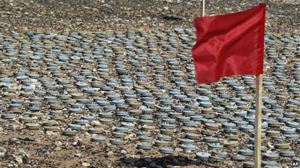By Ashley Luer
It has been more than a year since the White House announced that it would "soon" be releasing the results of a U.S. Landmine Policy review that was launched early in President Obama's first term in office.
Since 2009, the U.S. Campaign to Ban Landmines (USCBL) has been urging the Obama administration to conclude its review and to join the 1997 Convention on the Prohibition of the Use, Stockpiling, Production and Transfer of Anti-Personnel Mines and on Their Destruction, typically referred to as the "Ottawa Convention" or "Mine Ban Treaty."
The Mine Ban Treaty requires that states commit to not using, developing, producing, acquiring, retaining, stockpiling, or transferring anti-personnel landmines. Anti-personnel landmines are defined by the treaty as mines "designed to be exploded by the presence, proximity or contact of a person and that will incapacitate, injure or kill one or more persons."
In November 2013, the USCBL members sent a letter to the White House, requesting that the United States go public with its position before the Mine Ban Treaty's annual meeting in December. It didn't happen.
On Friday, January 31 the USCBL released a second letter, signed by experts on arms control and human rights issues, urging the administration to release the results of their now 5-year review and to announce that it has "determined that it is in the best interests of the United States to join the world's 161 States Parties to the 1997 Mine Ban Treaty."
The signers include leaders from Amnesty International, Handicap International, Human Rights Watch, the Friends Committee on National Legislation, and the Arms Control Association, among others.
Mine Ban Treaty supporters are frustrated with the delayed process and say that the United States should prohibit the use of antipersonnel mines and begin destruction of current stocks immediately. In their most recent letter, the USCBL members argue that there has been enough time for the review to be concluded and that a prompt decision "would allow the United States to explain its decision at the Mine Ban Treaty's Third Review Conference, which opens in Maputo, Mozambique on June 23, 2014."
The USCBL letter argues that it is vital for the United States to take a strong stand against landmines. To date, the United States is one of only 36 countries--including North Korea and Iran--that have not joined the Mine Ban Treaty. The United States is the only member of NATO and the only country in the Western Hemisphere (besides Cuba) that has not joined.
According to the USCBL, more than 16,000 people have been killed or injured by a landmine since the beginning of the U.S. policy review process in 2009. While the United States has not used antipersonnel mines since the First Gulf War in 1991, it still maintains a stockpile of more than 10 million antipersonnel mines for future use and the thousands of unexploded landmines worldwide still represent a serious threat to noncombatants.
According to the USCBL letter, "the Obama Administration has received letters of support for the United States to join the Mine Ban Treaty from treaty States Parties, 68 Senators, 16 Nobel Peace Prize Laureates, key NATO allies, senior military veterans, dozens of leaders from non-governmental organizations, victims of U.S. landmines, and more than 200,000 concerned Americans."
Resistance to joining the Mine Ban Treaty comes from some in the United States who want to retain the option to use so-called "smart" landmines – those that are equipped with a self-destruct and/or self-neutralizing feature – as a defensive mechanism to protect U.S. troops.
The USCBL argues that these concerns can be addressed through alternative military measures, and that the humanitarian value of phasing out mine use globally far outweighs any perceived military value to the United States. Now is the time, they argue, for President Obama to provide stronger leadership, to reinforce the norm against using landmines, and to push remaining Mine Ban Treaty hold-out states to reconsider their position.

